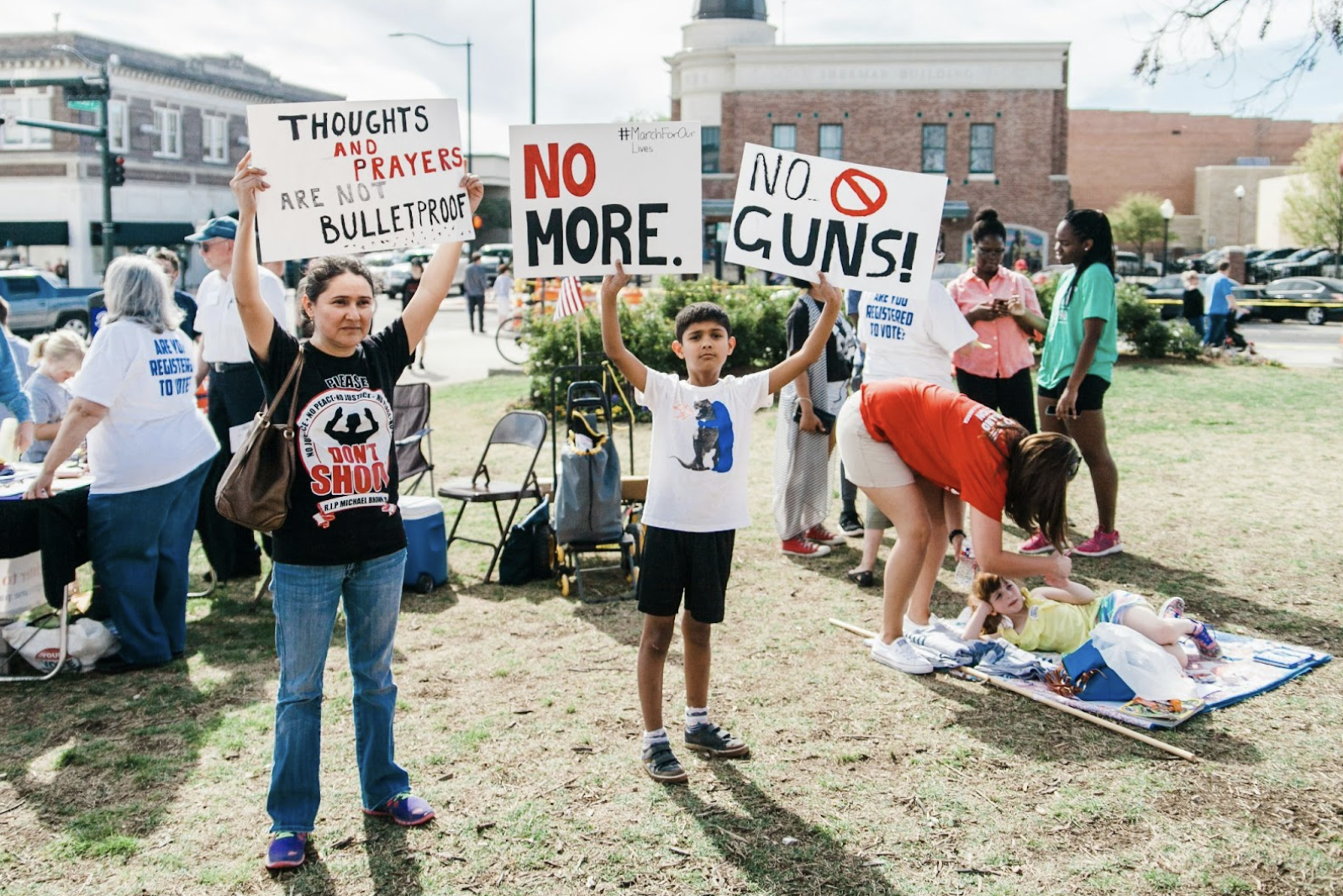Grappling with Gun Violence in the Wake of Charlie Kirk’s Assassination
https://unsplash.com/photos/people-holding-signage-on-green-grass-field-7VJB8VZkvMk
Edited by Owen Andrews and Sarah Ahmad
On September 10, 2025, right-wing activist and media personality Charlie Kirk was fatally shot and killed on the campus of Utah Valley University on the first stop of his “American Comeback Tour.” Graphic videos of the assassination were quickly plastered over social media sites, almost unavoidable. Politicians from Bernie Sanders to Mike Johnson were quick to condemn the assassination — President Trump ordered all flags to be flown at half mast, and in the days since, we have seen Republican lawmakers, personalities, and citizens using Kirk’s death to justify attacks against free speech, from the temporary suspension of Jimmy Kimmel’s show over comments about Kirk, to numerous educators being fired over comments about the figure.
On September 10, 2025, a student in Colorado opened fire at Evergreen High School, wounding at least two of his classmates before taking his own life. One of the victims was in critical condition, but news of this shooting was largely overshadowed by the reports of Kirk’s assassination. Cases like Evergreen get buried in days, due to the pervasive normalization of school shootings and gun violence in the 24-hour news cycle, unlike the turmoil that ripples through the system when something happens as shocking as a famous figure being killed.
While frustration on the excessive coverage of Kirk’s death is understandable given the lack of outcry the American media demonstrates following a school shooting, championing gun violence prevention isn’t a one-way street. One can’t be selective with what they condemn and what they support, and this applies to everyone. One cannot mourn Kirk at the cost of apathy towards the shooting at Evergreen, just as those outraged by Evergreen shouldn’t celebrate the killing of a political figure —even if that figure deeply disagreed with them on a fundamental level. Conservatives can’t condemn Kirk’s death while resisting gun reform after countless school shootings, and liberals can’t call for gun reform while hypocritically celebrating Kirk’s assassination. Doing either misses the point of the gun violence prevention movement: no one in America — not schoolchildren, not worshippers, not everyday citizens, not polarizing political figures — should fear for their safety in public spaces.
It’s difficult to grapple with a tragedy when the victim was a man who used his platform to minimize or outright deny the suffering of so many— Kirk’s callousness about gun violence and political violence have been cited by many who feel the speaker’s death is “deserved” in some respects.
Charlie Kirk’s rhetoric was distinctly and purposefully harmful to so much of what America should stand for. It was harmful to the countless women looking for autonomy over their own bodies in the wake of the overturning of Roe v. Wade. It was harmful to LGBTQ+ youth wanting to feel comfortable in their own skin. It was harmful, and often mocked victims of gun violence themselves.
Charlie Kirk’s final words were harmful themselves: an audience member asked him, “Do you know how many transgender Americans have been mass shooters over the last 10 years?”
Kirk replied, “Too many,”
The audience member informed him that the total was actually five and then asked: “Do you know how many mass shooters there have been in America over the last 10 years?”
“Counting or not counting gang violence?” Kirk replied, a racist dogwhistle that ended up being his last words.
Kirk was a divisive and harmful figure up until his last moments. But celebrating the death of someone who denied the existence of gun violence doesn’t solve gun violence. It further desensitizes America to the problem. Celebrating the death of Kirk doesn’t dismantle his harmful ideology — arguments could be made that it only strengthens his ideological influence over American conservatives. Rather, it normalizes gun violence as a political tool.
The level of fame or quality of character of a victim of gun violence should be irrelevant to the anger we feel over the violence occurring. It’s evidently not irrelevant in our current system, which is part of the problem: Kirk’s death would not be getting the coverage it is if he weren’t a famous & divisive figure. Evergreen is already receding into the background because school shootings have become part of America’s norm. This moral sorting of tragedies is corrosive. If the American public justifies violence against Kirk, who will it be justified against next? To paint his assassination as any different in its abhorrence than other tragedies, even if it is distinctly ironic, is to set a dangerous precedent for America’s democracy and civic discourse — and is to hurt the progress America is slowly making towards gun violence prevention.
Gun violence is preventable. Every single time. Columbine should have been a call to action to do the right thing. Or Sandy Hook. Or Pulse Nightclub, or Las Vegas, or Sutherland Springs, or El Paso, or Parkland, or Uvalde, or Virginia Tech, or Jacksonville, or Santa Fe, or Buffalo, or Lewiston, or UVA. Or so many more.
Condemning the assassination of Charlie Kirk does not absolve him of his harmful legacy. It simply affirms a principle that America hinges on: violence cannot be the price of political participation. If America’s democracy is to continue to thrive, and if we are to rid the country of the epidemic of gun violence once and for all, we must always defend that principle, especially when the victim is someone as divisive as Kirk.

